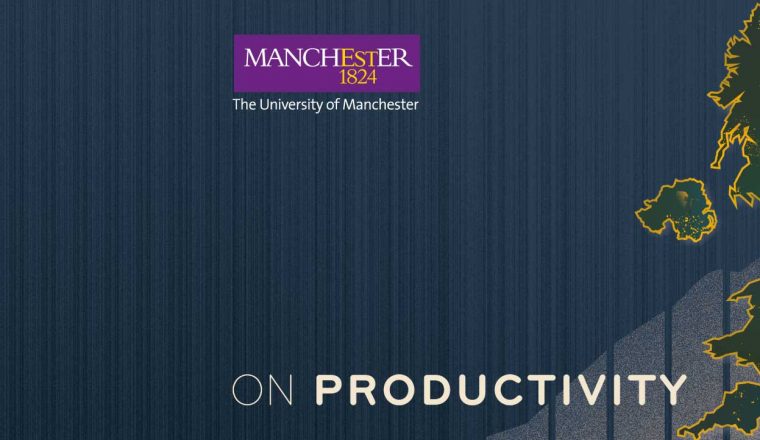Unlocking the Productivity Puzzle: Taking Stock of Season 3 of the Productivity Puzzles Podcast
A new season of Productivity Puzzles, the podcast from The Productivity Institute (TPI), is imminent – with the first episode set for release on 23 October.
In this blog, we look back at some of the key takeaways from Season Three of Productivity Puzzles, drawing out the most impactful insights and discussions that shaped the conversation on productivity. Across twelve episodes running between March 2024 and June 2025, including a special edition on the 2024 UK General Election, host Bart van Ark and a diverse group of experts from academia, business, and policy tackled the question: why has productivity growth stalled and what will it take to reignite it?
Business Productivity – Inside the Firm and Across the Economy
The Productivity Slowdown and Business Dynamism
The UK’s productivity growth has flatlined for nearly two decades, lagging behind peer economies. A key culprit is the decline in business dynamism – the churn of new firms entering, underperforming ones exiting, and resources shifting to more productive enterprises. Since 2000, startup activity and the growth of young firms have slowed, mirroring trends in the US and Europe.
Compounding this is productivity dispersion: a widening gap between “superstar firms” and the rest. While large, highly productive companies continue to thrive, many others stagnate. This imbalance hampers the diffusion of innovation, as breakthroughs fail to spread across the wider business ecosystem.
Findings from McKinsey Global Institute revealed that fewer than 100 standout firms were responsible for two-thirds of productivity growth across the US, UK, and Germany in key sectors. These firms – ranging from disruptors to incumbents – achieved gains not through incremental efficiency, but through bold strategic moves: scaling innovative business models and redefining customer value.
To find out more about highly productive firms and the imbalance of productivity dispersion, listen to Business Dynamism: is turbulence good for productivity?, featuring Rebecca Riley, John Van Reenen and Javier Miranda., as well as Books Festival: Diane Coyle & Jan Mischke, which features Diane Coyle discussing the importance and increasing difficulty of productivity measurement and Jan Mischke explaining how standout firms grow national productivity.
Innovation, Technology, and Business Model Transformation
True productivity gains come not just from digitisation but from business model innovation -rethinking how firms create, deliver, and capture value. Technologies like AI and enterprise software offer transformative potential, but only if firms reorganise processes and rethink their value propositions.
Transformation, not just automation, is key. Simply digitising existing workflows yields limited returns. The challenge lies in overcoming operational inertia and cognitive resistance to change.
For more on this topic, listen to Business model innovation and strategic productivity, featuring Sir Charlie Mayfield and Chander Velu.
Leadership Perspectives and Organisational Culture
Productivity is often viewed differently across the C-suite:
- Chief Human Resource Officers (CHROs) link it to culture, wellbeing, and high performance.
- Chief Financial Officers (CFOs) focus on value creation and resource efficiency.
- Chief Information Officers (CIOs) emphasise automation and cost reduction.
To align these perspectives, firms need a shared “North Star” – a unified narrative across the organisation about turning resources into better outcomes for customers, investors and employees. Trust, engagement and continuous innovation are essential ingredients.
If you want to find out more about productivity from a C-suite perspective, listen to Strategic Productivity: Unlocking the UK’s Productivity Potential, with Irena Teneva, Nina Jörden and Marion Devine, as well as How do business leaders think about productivity?, with guests Katy Davies, Lou Cordwell, Greg McDonald.
Policy Levers for Business Productivity
Government has a vital role in enabling business productivity – not by stepping back, but by stepping in strategically. Key areas include:
- Technology and Innovation: Supporting SMEs with digital literacy and access to “CTO on demand” services.
- Internationalisation: Simplifying export procedures and reducing red tape, especially for SMEs.
- Skills and Management: Expanding practical, tailored training and improving uptake of programmes like Help to Grow Management.
- Framework Conditions: Ensuring regulatory stability and fair competition.
To find out more about how policy can impact productivity, listen to Government policy and business productivity: does it help or harm?, featuring Stephen Roper, Jane Galsworthy and Tera Allas.
A recurring concern across episodes of this season was the fragmentation of business support, which leads to underutilisation. Experts called for a cohesive national institution to coordinate growth and productivity efforts.
Regional Productivity, Devolution, and Industrial Strategy
The Geography of Productivity
The UK’s regional productivity disparities are unusually large and persistent. London and the Southeast consistently outperform other regions and devolved nations. These disparities reflect systemic issues that require coordinated, long-term interventions.
Policy autonomy is most advanced in the three devolved nations. How has it impacted on the productivity trajectory?
- Scotland benefits from a diverse sectoral mix but faces challenges in its “middle core” of businesses and workforce health.
- Northern Ireland saw a post-pandemic productivity uptick, largely due to measurement quirks and pandemic-related contracts. Underlying issues include low skills and high economic inactivity.
- Wales has the lowest labour productivity in the UK, with deep-rooted challenges in education, health, infrastructure, and connectivity.
- The creation of regional Productivity and Growth Boards or Productivity Commissions could help to provide strategic oversight, expert advice, and accountability in devolved nations.
Get more information about how the productivity disparities across the devolved nations, listen to A Productivity Agenda for the Devolved Nations, with Graeme Roy, John Turner and Melanie Jones.
Devolution and Institutional Coordination
While devolution aims to empower local areas, it can lead to fragmentation and misalignment with national policy. The UK lacks the fiscal devolution seen in federal systems, limiting local capacity to drive growth.
A key concern is the loss of state capacity to coordinate complex initiatives. The struggles of rail infrastructure in the north of England due to fragmented leadership and lack of strategic planning illustrates the need for an “overarching guiding mind” in policy implementation. Enhanced collaboration between mayors and central government – such as joint foreign investment trips – was also a key recommendation from the podcast
For more on the regional productivity across England, listen to A Regional Productivity Agenda for England, with Andy Westwood, Jennifer Williams and Jack Shaw.
Many Headwinds, But a Clearer Roadmap Can Help
Rethinking Industrial Strategy
A well-designed industrial strategy is essential for long-term growth. Past strategies have been criticised for being too broad – a “theory of everything.” The new approach must be:
- Focused and Selective: Supporting frontier innovation and enabling catch-up growth.
- Stable and Long-Term: Avoiding the policy churn that has plagued UK growth efforts.
- Place-Based: Leveraging regional strengths and addressing local challenges.
The strategy must avoid protectionism, political capture, and the temptation to simply “hand out money” to superstar firms. Instead, it should make educated bets on sectors with comparative advantage and emerging demand, coordinating across policy areas to generate spillovers.
If you want to know more about industrial strategy and its importance to productivity growth, listen to Industrial Strategy: What To Do and What Not To Do?, with Dame Kate Barker, Giles Wilkes and Andy Westwood.
Global Connections: Trade and Productivity
International trade also plays a vital role in boosting productivity through specialisation, competition, and innovation. Exporting firms tend to be more dynamic and resilient – but the UK’s trade performance has been hit significantly by Brexit and the COVID pandemic, especially in goods.
Despite these challenges, services exports have grown strongly, helped by digitalisation and overseas delivery models. A pro-productivity trade policy that aligns with industrial strategy, innovation, and skills is needed. For small and medium-sized enterprises, cutting red tape and simplifying export processes remain essential to unlocking global potential.
For more insights on the vital link between international trade and the UK’s productivity challenges, listen to Trade and UK Productivity: From Global Markets to Local Gains, featuring Jun Du, Emily Fry and Alan Lowry.
Summing Up
Season 3 of Productivity Puzzles painted a vivid picture of the UK’s productivity challenge: complex, entrenched, but not insurmountable. The path forward requires:
- Transforming business models and fostering innovation.
- Aligning leadership around a shared productivity vision.
- Implementing coherent, long-term industrial and trade policies.
- Empowering regions through thoughtful devolution and coordination.
Productivity is not just an economic metric, it’s a measure of our ability to turn scarce sources and human effort into better outcomes for people, firms and places. Unlocking it demands a shared commitment to continuous improvement, collaboration and resilience.
To find out more about the major obstacles for UK productivity growth and the future of productivity listen to Wrapping Up 2024: Is there a productive growth path forward?, featuring Diane Coyle and Richard Jones.
What’s next?
We’re kicking off Season 4 by celebrating five years of TPI. In our first episode, we’ll bring together five panellists who contributed to our International Research Conference on 4–5 September. They’ll reflect on the insights from TPI’s research programme over the past five years and explore what new topics should shape the agenda going forward.
Later in the season, we’ll hear from Jeffrey Anderson of Georgetown University, our keynote speaker at the conference, who will share his perspective on place-based growth and productivity.
And as always, we’ll stay on top of current developments – including a special episode in mid-November unpacking what the UK Chancellor’s new Budget means for productivity. So stay tuned to Productivity Puzzles by subscribing to the podcast wherever you get your podcasts.



